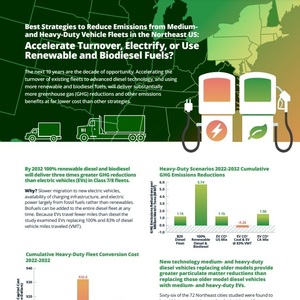Biofuels offer emissions solution for medium, heavy-duty trucks

July 25, 2022
BY Diesel Technology Forum
A new study that evaluates several approaches to reducing greenhouse gas (GHG) and other emissions from medium and heavy-duty vehicles from 2022-2032 finds considerable advantages with advanced diesel technology particularly when using renewable biofuels, as compared to an electrification strategy.
Medium and heavy-duty trucks operating in 10 Northeastern states (Connecticut, Delaware, Massachusetts, Maryland, Maine, New Jersey, New York, Pennsylvania, Rhode Island, and Vermont) that have adopted California’s low emission (LEV) and zero emission vehicle (ZEV) regulations were studied by Stillwater Associates for the Diesel Technology Forum. An analysis was undertaken to analyze the environmental benefits attainable from three strategies in the 2022-2032 period; electrification, accelerated fleet turnover and use of biodiesel and renewable diesel fuel.
“As we look for the best ways to reduce greenhouse gas and other emissions, this study demonstrates that accelerating fleet turnover and use of renewable and biodiesel fuels can deliver significantly more benefits (3X) that outweigh those possible from EVs in the region in the study period. Advanced diesel technology is more effective, more affordable, and most importantly more available than others.
“The urgency to implement solutions to reduce greenhouse gases from transportation and address climate change is heard on a daily basis. Transitions to new energy sources still have considerable uncertainties and longer timeframes – a decade or more -- to meaningful implementation. Some solutions will be available sooner than others and at larger scale than others. Advanced diesel technology, as well as renewable and biodiesel fuels, are key available solutions that can deliver big impacts today,” said Allen Schaeffer, executive director of the Diesel Technology Forum.
Advertisement
Advertisement
The considerable benefits of using low-carbon renewable biobased diesel fuels becomes clearer from this analysis. As these fuels can be used in all diesel vehicles today, fueling the diesel vehicles in the study with 100 percent renewable diesel resulted in three times larger cumulative GHG reductions by 2032 than the EV scenarios. Using B20 – a 20 percent blend of biodiesel with 80 percent petroleum diesel – provided about the same cumulative GHG reduction.
“All eyes seem to be focused on electrification as the best if not the only strategy for the future fuel and technology in the transportation sector. This work has illuminated that’s overly simplistic; that there are significant, less expensive, and more available emissions reduction strategies for these workhorse vehicles which can enable greater emission reductions to be delivered more rapidly,” said Gary Yowell, automotive engineer at Stillwater Associates.
Beyond GHG emissions, the research also highlighted impacts of an advanced diesel vs. electrification strategy on regional air quality as well, finding that the business-as-usual case replacing pre-2007 model year diesel vehicles which lacked diesel particulate filters with advanced technology diesel vehicles provided the largest particulate matter (PM) reduction. This is due to new technology diesel engines’ 98 percent PM reductions compared to EVs’ 95 percent PM reduction assuming power from the U.S. Grid Mix.
As for nitrogen oxides (NOx) emissions, EVs have 98.5 percentlower NOX than pre-2007 diesel vehicles on a per mile basis, and 2010 and later MY vehicles have 79 percent less NOx emissions than a 2007 diesel model. However, when replacing a diesel medium and heavy-duty vehicle with an EV and evaluated on an annual miles driven basis, the NOx benefit is diminished. EVs are generally deployed on shorter routes and have a shorter range of operation than that of a comparable diesel vehicle, with about 87 percent of the mileage on a daily basis. Given this mileage difference, NOx emission reductions for a fleet transitioning to EV will be less than the business-as-usual turnover from older generation diesel to advanced technology with selective catalytic reduction (SCR) systems that reduce NOx by 98 percent.
Advertisement
Advertisement
On a cumulative fleet conversion cost basis, turning over a medium and heavy-duty fleet of 10,000 vehicles in the region over to EV carries a price tag more than three times higher than the equivalent cost for new technology diesel vehicles. The incremental EV cost for Class 7/8 vehicles is $250,000 for the vehicle and $45,000 for charging infrastructure.
View and download the full study at https://dieselforum.egnyte.com/dl/MWHPcRW4e6
View and download the infographic at https://dieselforum.egnyte.com/dl/fZ9UzT4y6h
Related Stories
U.S. Secretary of Agriculture Brooke L. Rollins today announced the reorganization of the USDA, refocusing its core operations to better align with its founding mission of supporting American farming, ranching, and forestry.
The U.S. Department of Energy’s Office of Energy Efficiency and Renewable Energy is soliciting public comments on a preliminary plan for determining provisional emissions rates (PER) for the purposes of the 45Z clean fuel production credit.
On July 17, Iowa’s cost-share Renewable Fuels Infrastructure Program awarded $1.12 million in grants for 20 applicants to add B11 and 4 applicants to add E15 to retail sites. This was the first meeting following the start of RFIP’s fiscal year.
Par Pacific Holdings Inc., Mitsubishi Corp. and ENEOS Corp. on July 21 announced the signing of definitive agreements to establish Hawaii Renewables LLC, a joint venture to produce renewable fuels at Par Pacific’s refinery in Kapolei Hawaii.
A new study published by the ABFA finds that the U.S. EPA’s proposal to cut the RIN by 50% for fuels made from foreign feedstocks, as part of its 2026 and 2027 RVOs, could stall the growth of the biomass-based diesel (BBD) industry.
Upcoming Events










